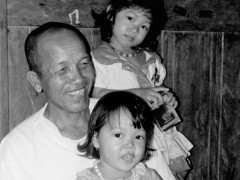The Forest and Land Fire is Real, the Law Enforcement is Not
By AdminSouth Kalimantan and the Unclear Fate of the Palm Oil Moratorium
Oil palm plantation practices often neglect good environmental governance because monoculture plants tend to absorb a lot of water and change the water management in peat swamp ecosystems.
Oil palms are mostly cultivated in peat swamp ecosystems which are easily degraded when drained. This also poses a problem. Peat degradation causes ecological disasters, such as floods and fires. The big flood in South Kalimantan in 2021 is still fresh in the people's memory. Floods hit 13 districts and cities, including the Meratus mountainside, submerging the peat swamp ecosystem.
The Agency for the Assessment and Application of Technology (BPPT) estimated that IDR 1.349 trillion was lost due to the floods. These losses were suffered by the agriculture, fishery, infrastructure, education, health, and social protection sectors.
The government claimed that the flood was caused by the high intensity of rain. However, it is also undeniable that damage to the carrying and supporting capacity of the upstream environment, including the ecological damage in the Meratus Mountains, has contributed to the flood.
The damage was caused by extractive industries, such as coal mining, industrial plantation forests (HTI), and logging concessions in natural forests (HPH), which are commonly found in mountainous areas. As for the downstream (peat swamp ecosystem), floods occur because the peat swamps are invaded by large-scale oil palm monoculture plantations. Data from the South Kalimantan Environment Office shows that 60 percent of peatlands in South Kalimantan are degraded due to land conversion.
Referring to data from the Indonesian Forum for the Environment (WALHI) South Kalimantan, almost 50 percent of the province's areas were converted into mines and oil palm plantations. WALHI South Kalimantan also found that land fires in 2019 occurred in areas owned by large-scale monoculture plantations.
Tapin and Hulu Sungai Selatan were the two districts with the largest area of burned peatlands, i.e. 32.5 percent and 43.2 percent of the total burned peatlands in South Kalimantan.
There were 106 hotspots recorded in PT. Plantindo Agro Subur (PAS) area in Tapin, with a total burned area of 1,972.2 hectares. There were 39 hotspots in PT Subur Agro Makmur (SAM) concession area in Hulu Sungai Selatan, with a total burned area of 1,073.3 hectares.
Considering the floods and land and forest fires, the presidential instruction on palm oil moratorium should be extended. The moratorium on permits for oil palm plantations should be an opportunity for a thorough evaluation of the companies' practices that trigger ecological disasters.
The evaluation results should be disclosed to the public. Since data on the work of extractive and monoculture companies is difficult to obtain, data held by the government and civil organizations can be used as a reference. This is to stop the government from giving the red carpet to investors who undermine environmental governance.
The government should also start thinking about terminating new permits without any moratoriums. The Presidential Instruction only temporarily stops permit issuance. The existing permits already create a mess, we can only imagine what will happen if new permits are granted.
President Jokowi should open his eyes when visiting South Kalimantan. Instead of only attending ceremonial activities, he should go and see the environmental damage after the ecological disaster in early 2021. Management of the flood disaster and its victims should be evaluated.
*The author is the Executive Director of WALHI South Kalimantan and Coordinator of Simpul Jaringan Pantau Gambut South Kalimantan
** THIS ARTICLE WAS PREVIOUSLY PUBLISHED ON 26 OCTOBER 2021 ON ONLINE MEDIA JEJAKREKAM.CO**




